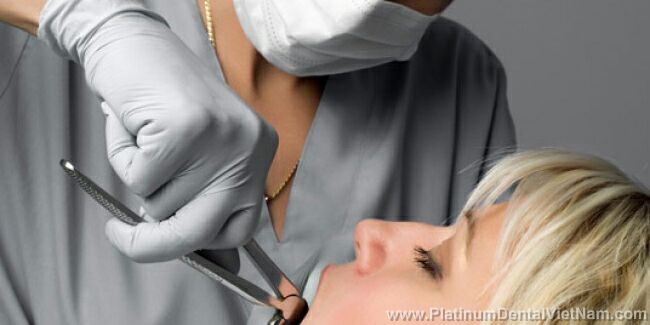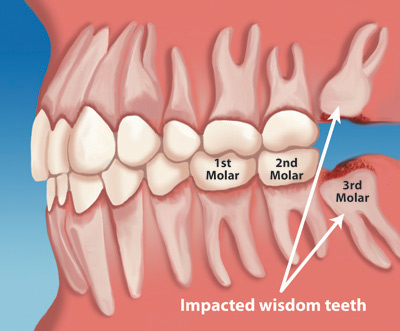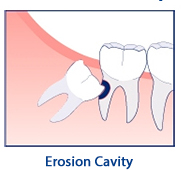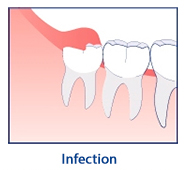
Extractions – Wisdom Teeth Removal
– One area of specialty areas within dentistry is know as oral surgery and this applies to procedure of a surgical nature, such as the extraction of teeth or wisdom teeth. Oral surgery requires additional training in techniques to perform procedures with care, helping patients to be able to use their teeth and mouths again.
– If you have advanced tooth decay or an impacted wisdom tooth, you may require oral surgery to have them safety extracted. Depending on your particular case and the severity of your problem, you will be given anaesthetic and offered sedation if you are anxious.
– It is important to always get the advice of a dental professional if you are worried about any of your teeth. Never attempt to pull out our own tooth out at home as this could cause a more serious problem for you. Dentists have the right equipment and sterile environment in which to perform this type of procedure with the utmost care and your recovery can be fairly quick. In the case of wisdom teeth extractions you may have some swelling after the procedure and discomfort that can be eased with over the counter pain killers.
What is the wisdom teeth?

Wisdom teeth are the third permanent molars and are the last teeth develop. They usually erupt or come into the mouth in our late teens and early twenties. In most cases the tooth bearing area of the upper and lower jaws are too small to accommodate these wisdom teeth and they remain buried within bone. These wisdom teeth are termed “impacted”.
Why do wisdom teeth need to be removed?
- Decay
 Saliva, bacteria and food particles can collect around an impacted wisdom tooth, causing it or the next tooth to decay. It is very difficult to remove such decay. Pain and infection will usually follow.
Saliva, bacteria and food particles can collect around an impacted wisdom tooth, causing it or the next tooth to decay. It is very difficult to remove such decay. Pain and infection will usually follow. - Gum Infection (Pericoronitis)
 When the wisdom tooth is partially erupted, food and bacteria collect under the gum causing a local infection. This may result in bad breath, pain, swelling and trismus (inability to open the mouth fully). The infection can spread to involve the cheek and neck. Once the initial episode occurs, each subsequent attack becomes more frequent and more severe.
When the wisdom tooth is partially erupted, food and bacteria collect under the gum causing a local infection. This may result in bad breath, pain, swelling and trismus (inability to open the mouth fully). The infection can spread to involve the cheek and neck. Once the initial episode occurs, each subsequent attack becomes more frequent and more severe. - Pressure Pain
 Pain may also come from the pressure of the erupting wisdom tooth against other teeth. In some case this pressure may cause the erosion of these teeth.
Pain may also come from the pressure of the erupting wisdom tooth against other teeth. In some case this pressure may cause the erosion of these teeth. - Orthodontic Reason (Braces)
Many younger patients have had prolonged orthodontic treatment to straighten teeth. Wisdom teeth may cause movement of teeth (particularly the front teeth) when they try erupt and this will compromise the orthodontic result. - Prosthetic Reason
Patients who are to have dentures constructed should have any wisdom tooth removed. If a wisdom tooth erupts beneath a denture it will cause severe irritation and if removed, the patient will need to have a new denture constructed as the shape of the gums will have changed. - Cyst Formation
A cyst (fluid filled sac) can develop from the soft tissue around an impacted wisdom tooth. Cysts cause bone destruction, jaw expansion and displacement or damage to nearby teeth. The removal of the tooth and cyst is necessary to prevent further bone loss. Rarely tumors may develop within these cyst or the jaw may fracture spontaneously if the cyst grows very large. - Travel to Inaccessible Places
If you are going to an area where specialist dental services are not available to have them removed beforehand.
Impacted wisdom teeth are almost certain to cause problems if left in place. This is particular true of the lower wisdom teeth. Such problems may occur suddenly, and often at the most inconvenient times.
When is the best time to have my wisdom teeth removed?
- It is now recommended by specialists that impacted wisdom teeth be removed between the ages of 14 and 22 years whether they are causing problems or not. Surgery is technically easier and patients recover much more quickly when they are younger. What is a relatively minor operation at 20 can become quite difficult in patient over 40. Also the risk of complications increases with age, and the healing process is slower.
How is the surgery done?
- An incision is made in the gum tissue and the tissue is reflected so that the tooth can be seen. If bone is covering the tooth, it may need to be removed in order to expose and extract the tooth. The tooth maybe removal whole, but it is usually necessary to cut it into sections. Each section is then individually removed. The surgical procedure will take about half an hour, although this varies according to each case. You may choose to have the surgery done under local anaesthesia or under general anaesthesia in the hospital setting.
- In most cases normal activities can be resumed within a few days depending in the degree of impaction and the number of teeth removed.
What should I expect after the surgery?
- The amount of discomfort will depend on how easy the removal of the tooth was. There is usually some swelling and discomfort for a few days afterwards, and it is important to follow any device you will be given about mouth washes etc, to help with the healing. Pain killers prescribed by your surgeon will usually deal with any pain. It is best to stay fairly quiet and relaxed for 24 hours afterwards to make sure there are no bleeding problems. Most patients generally have a soft diet for 3-5 days. There maybe some stitches to help the gum heal over and you will be reviewed in a week’s time.
What are common complications and risk associated with removing wisdom teeth?
- Dry sockets
A dry socket occurs when either an adequate blood clot has failed to form in the extracted tooth’s socket. Since the formation of a blood clot is an important part of the healing process, healing is delayed. The typical dry socket produces a dull pain that doesn’t appear until three or four days after the tooth has been extracted. The pain can be moderate to severe. There is often a foul odor associated with this condition. Usually a medicated dressing will be placed in the dry socket that can soothe and moderate the pain.Dry sockets are found to occur more often in women (even more so in those taking oral contraceptives), persons over the age of 30, and smoker.
- Paresthesia
Wisdom teeth can be positioned in the jaw in a manner in which they lie in close proximity to nerves. Sometimes during the process of extracting a wisdom tooth these nerve can be bruised or damaged. As a result, temporary numbnesss of the tongue, lip or chin may occur. Having this condition is termed “paresthesia”. A hope of avoiding the complication of paresthesia is one reason why dentists suggest that wisdom teeth be removed when a patient is “young”. As humans age on through their twenties the roots of their wisdom teeth continue to form and develop, making the teeth more difficult to extract without disturbing surrounding tissue (like nerves). The incidence of nerve damage for wisdom teeth removal runs as high as 10% after the age 35, whereas it is rare for teenagers (less than 1%).


